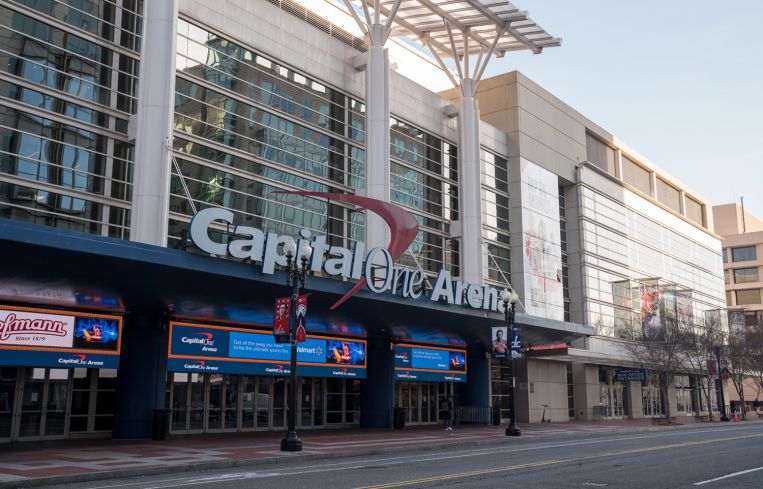DC Leaders to Wizards and Capitals: Hear Us Out
By Keith Loria December 14, 2023 4:02 pm
reprints
Despite the bombshell announcement Wednesday about a deal to move the Washington Wizards and Capitals to Alexandria, Va., local leaders have not given up hope that the teams will remain in their longtime Washington, D.C., home.
The deal, hammered out by Virginia Gov. Glenn Youngkin and Monumental Sports & Entertainment CEO Ted Leonsis, the owner of the NBA and NHL franchises, would have the teams move to a $2 billion entertainment district in Virginia’s Potomac Yard.
While negotiating with Youngkin, Leonsis was simultaneously pitching District officials on a $800 million modernization project for the Capital One Arena, where the teams have played since the complex opened in 1997.
When news of the deal first leaked, D.C. Mayor Muriel Bowser and D.C. Council Chairman Phil Mendelson made a last-ditch effort Tuesday night to entice Leonsis to stay, with an offer of $500 million in city funding toward the renovation of the Capital One Arena.
The legislation would extend Monumental’s lease — set to expire in 2027 — until 2052, with financing for upgrades distributed over a three-year period, starting next year. The legislation also states the Capitals and the Wizards would not be able to relocate outside the District until the end of the lease.
“Downtown D.C. is the District’s economic engine that provides revenue resources to support important programs in the city,” Bowser said in a prepared statement. “Mr. Leonsis and Monumental Sports have been critical partners in keeping our downtown thriving, especially after the pandemic.”
City leaders have also committed to a swift and expedited review and approval process to meet current construction plans for the arena.
But there’s little indication that Monumental is even considering walking back its deal with Youngkin. And Bowser is already establishing a task force to come up with potential new uses for the Capital One Arena if Monument does relinquish the site, which is critical to the area’s economic activity.
While the loss might not be fatal, the Wizards and Capitals are the largest draw to what is a dynamic pocket in a city still struggling to return to its pre-pandemic vibrancy.
Losing the 81 games per year would certainly be detrimental to the downtown district, said Mark Conrad, an associate professor of law and ethics at Fordham University’s Gabelli School of Business. “Whatever vibrancy it has would be greatly diminished as people would not come, nor shop, meaning that the economy would be adversely affected,” he told Commercial Observer.
In fact, when the Capital One Arena opened in 1997, it was a powerful signal of a rebounding District as it emerged from the mid-1990s Control Board period, according to the DowntownDC Business Improvement District.
“For more than a quarter-century, it has contributed significantly to the vibrancy and energy of downtown, serving as the economic engine at the heart of the city that fuels local businesses, creates jobs, and supports D.C.’s investments in all eight wards,” a spokesperson from the BID told Commercial Observer.
Securing a deal to keep the Capitals and Wizards in Downtown D.C. is critical to the economic future of downtown and the city as a whole, said Gerren Price, president and CEO of the BID.
“We recognize that Monumental must consider offers from other jurisdictions in order to make the best possible business decision for their operations, but we strongly believe that keeping these teams in the city will yield the highest regular attendance of any site in the region,” Price said in a prepared statement.
One idea floating around to make up some of the dates is to bring the WNBA’s Washington Mystics, which now plays at the Entertainment and Sports Arena in Congress Heights, to play its 18 home games there. The team sells out most games, but the arena holds only about 4,500 fans per game compared to the 17,000 fans who come to a typical Wizards game and the 18,500 fans at an average Capitals game.
The 20,000-seat arena hosts approximately 200 concerts annually as well, so upping that number could also fill some of the missing dates.
Whether it’s too little, too late is still unknown. The Potomac Yard deal still needs to be approved by the governor and the Alexandria City Council, but it was made clear in the Wednesday announcement that no hurdles were expected. And considering Leonsis’s involvement in the project, it seems unlikely he will be swayed.
However, there is already pushback from the community. The Potomac Yard site is owned by Amazon HQ2 developer JBG Smith, which will also develop the arena, and is located near the new Potomac Yard Metro station and the Virginia Tech Innovation Campus, expected to open next year. Residents are concerned about congestion, as well as the price tag.
Keith Loria can be reached at Kloria@commercialobserver.com.



